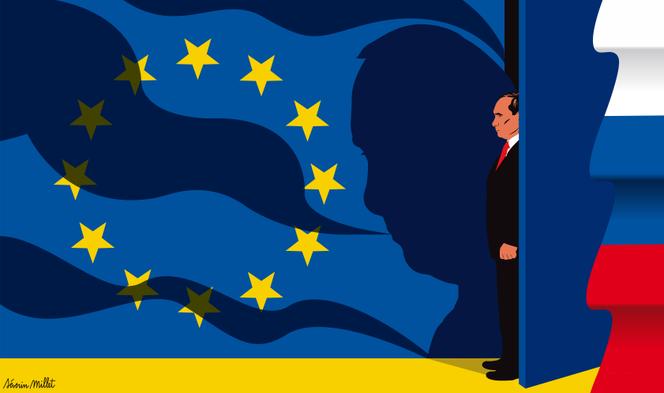


Since the fall of 2023, seven European Union countries have been investigating a Moscow-inspired operation aimed at destabilizing the June 9 European elections and strengthening pro-Russian political forces within the European Parliament. These countries, including France, have mobilized their intelligence services and, in some cases, their judicial authorities to track down Moscow's proxies, be they members of Parliament, working in business or journalists who, in return for payment, may have broadcast anti-Western diatribes and financed complicit media outlets. Among them are several leading figures on the French far right.
On May 29, Belgian and French police forces searched the home and offices in Brussels and Strasbourg of Guillaume Pradoura, a French assistant to Dutch member of the European Parliament Marcel de Graaff, a member of the Forum for Democracy, a Dutch party allied with Russian President Vladimir Putin. Pradoura had previously worked as an assistant for MEP Nicolas Bay – a former member of the Rassemblement National (RN, far right), now a member of Eric-Zemmour's Reconquête! – and had been expelled from the RN in 2019 for an anti-Semitic photo. He later worked with Maximilian Krah, an MEP for Alternative for Germany (AfD), a German far-right party, until 2022.
The Belgian judicial authorities are acting as part of an investigation opened in April for "influence peddling, passive corruption and membership of a criminal organization." According to the federal prosecutor's office, members of the Strasbourg-based institution were "approached and paid" to distribute Russian propaganda. Pradoura may have facilitated exchanges between pro-Russian backers and the various far-right lists in the European Parliament. Police seized USB sticks, computers, letters and photos from his home. Pradoura has not yet been questioned in this case.
The work of the judiciary overlaps with that of the intelligence services. In March, Czech authorities denounced the activities of the Voice of Europe news website, registered in Prague, accusing it of disseminating Russian propaganda and bribing European politicians. On March 28, the Polish counter-espionage services declared that they had seized almost €100,000 during raids on pro-Putin networks.
According to information gathered by a group of news organizations including Le Monde, the Czech daily Denik N, the Polish Gazeta Wyborcza, the Belgian Le Soir and De Morgen, the German weekly Die Zeit and the Kontraste program on the German TV channel ARD, the operation also relied on two other news sites: Visegrad Post and Golos.eu. The former is popular among the French far right, and was founded in Hungary by two French identitarians, François Lavallou, known as "Ferenc Almassy," and Nicolas de Lamberterie. In 2022, Almassy provided various services for the foundation set up by Identity and Democracy, the group to which the RN is attached in the European Parliament. The second site, registered in Russia in 2018, claims to "fight for pro-Russian or Russian-born Ukrainians who are politically persecuted or exposed to ethnic hatred." Emails for Golos.eu are directed to a server with a Russian IP address.
You have 61.16% of this article left to read. The rest is for subscribers only.
